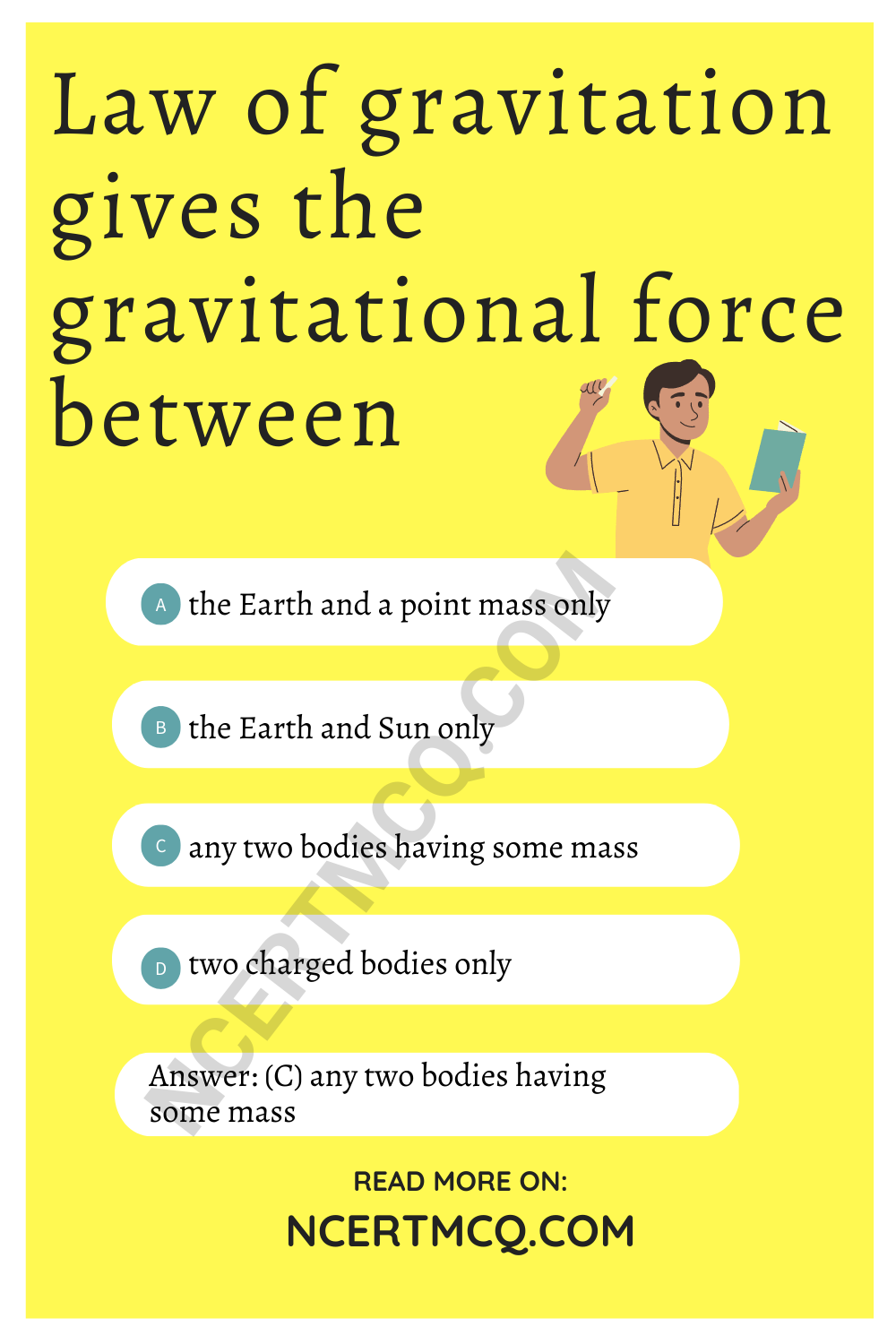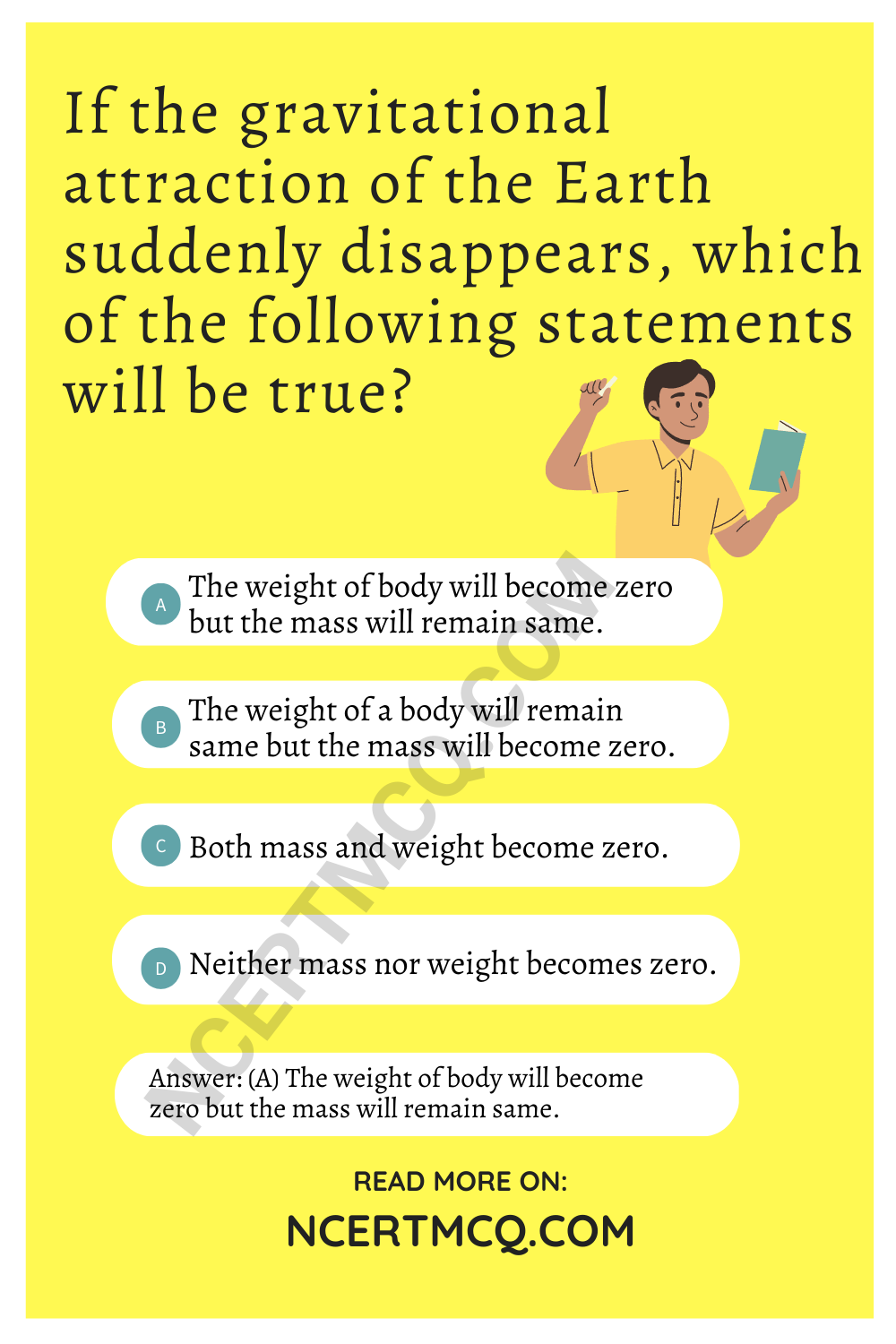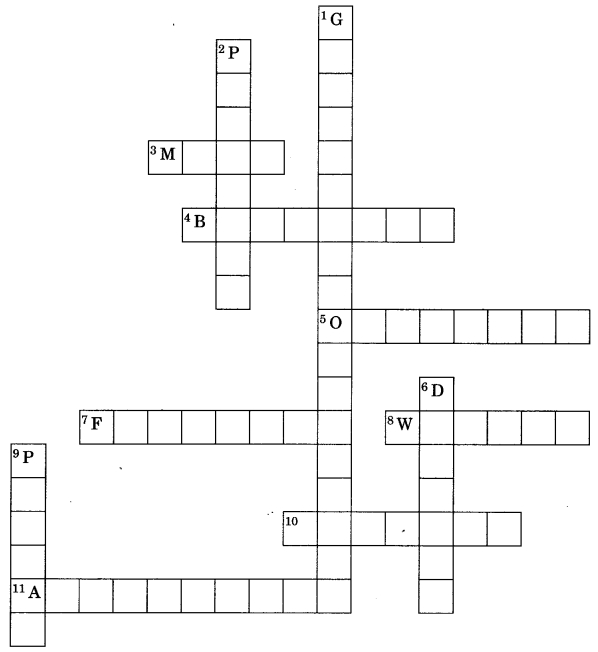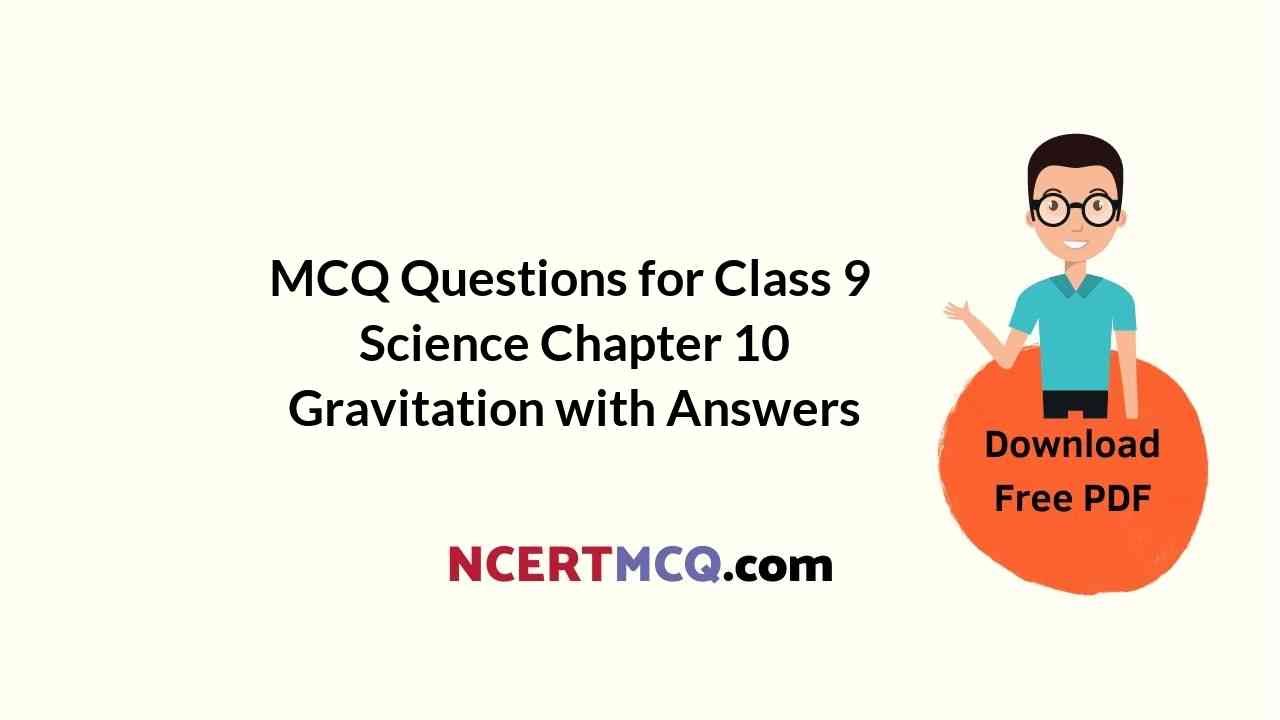Check the below Online Education NCERT MCQ Questions for Class 9 Science Chapter 10 Gravitation with Answers Pdf free download. MCQ Questions for Class 9 Science with Answers were prepared based on the latest exam pattern. We have Provided Gravitation Class 9 Science MCQs Questions with Answers to help students understand the concept very well. https://ncertmcq.com/mcq-questions-for-class-9-science-with-answers/
You can refer to NCERT Solutions for Class 9 Science Chapter 10 Gravitation to revise the concepts in the syllabus effectively and improve your chances of securing high marks in your board exams.
Class 9 Science Physics Chapter 10 MCQ With Answers
Physics Class 9 Chapter 10 MCQs On Gravitation
Gravitation Class 9 MCQ Chapter 10 Question 1.
Two objects of different masses falling freely near the surface of the moon would
(a) have same velocities at any instant
(b) have different acceleration
(c) experience forces of same magnitude
(d) undergo a change in their inertia
Answer
Answer: (a) have same velocities at any instant
Gravitation MCQ Class 9 Chapter 10 Question 2.
The value of acceleration due to gravity
(a) is same on equator and poles
(b) is least on poles
(c) is least on equator
(d) increases from pole to equator
Answer
Answer: (c) is least on equator
Class 9 Gravitation MCQ Chapter 10 Question 3.
The gravitational force between two objects is F. If masses of both objects are halved without changing the distance between them, then the gravitational force would become
(a) F/4
(b) F/2
(c) F
(d) 2F
Answer
Answer: (a) F/4
MCQ On Gravitation Class 9 Chapter 10 Question 4.
A boy is whirling a stone tied to a string in a horizontal circular path. If the string breaks, the stone
(a) will continue to move in the circular path
(b) will move along a straight line towards the centreof the circular path
(c) will move along a straight line tangential to the circular path
(d) will move along a straight line perpendicular to the circular path away from the boy
Answer
Answer: (c) will move along a straight line tangential to the circular path
MCQ Of Gravitation Class 9 Chapter 10 Question 5.
An object is put one by one in three liquids having different densities. The object floats with \(\frac{1}{9}\), \(\frac{2}{11}\) and \(\frac{3}{7}\) parts of their volumes outside the liquid surface in liquids of densities d1, d2 and d3respectively. Which of the following statement is correct?
(a) d1 > d2 > d3
(b) d1 > d2 < d3
(c) d1 < d2 > d3
(d) d1 < d2 < d3
Answer
Answer: (d) d1 < d2 < d3
Gravitation MCQ Chapter 10 Question 6.
In the relation F = GM mld2, the quantity G
(a) depends on the value ofg at the place of observation
(b) is used only when the Earth is one of the two masses
(c) is greatest at the surface of the Earth
(d) is universal constant of nature
Answer
Answer: (d) is universal constant of nature
Class 9 Science Chapter 10 MCQ Question 7.
Law of gravitation gives the gravitational force between
(a) the Earth and a point mass only
(b) the Earth and Sun only
(c) any two bodies having some mass
(d) two charged bodies only
Answer
Answer: (c) any two bodies having some mass

MCQ Questions On Gravitation For Class 9 Chapter 10 Question 8.
The value of quantity G in the law of gravitation
(a) depends on mass of Earth only
(b) depends on radius of Earth only
(c) depends on both mass and radius of Earth
(d) is independent of mass and radius of the Earth
Answer
Answer: (d) is independent of mass and radius of the Earth
Gravitation Class 9 MCQ With Answers Chapter 10 Question 9.
Two particles are placed at some distance. If the mass of each of the two particles is doubled, keeping the distance between them unchanged, the value of gravitational force between them will be
(a) \(\frac{1}{4}\) times
(b) 4 times
(c) \(\frac{1}{2}\) times
(d) unchanged
Answer
Answer: (b) 4 times
MCQ Gravitation Class 9 Chapter 10 Question 10.
The atmosphere is held to the Earth by
(a) gravity
(b) wind
(c) clouds
(d) Earth’s magnetic field
Answer
Answer: (a) gravity
Class 9 Physics Gravitation MCQ Chapter 10 Question 11.
The force of attraction between two unit point masses separated by a unit distance is called
(a) gravitational potential
(b) acceleration due to gravity
(c) gravitational field
(d) universal gravitational constant
Answer
Answer: (d) universal gravitational constant
Gravitation Class 9 MCQ Questions And Answers Chapter 10 Question 12.
The weight of an object at the centre of the Earth of radius R is (NCERT Exemplar)
(a) zero
(b) infinite
(c) R times the weight at the surface of the Earth
(d) 1/R2 times the weight at surface of the Earth
Answer
Answer: (a) zero
Class 9 Science Gravitation MCQ Chapter 10 Question 13.
An object weighs 10 N in air. When immersed fully in water, it weighs only 8 N. The weight of the liquid displaced by the object will be
(a) 2 N
(b) 8 N
(c) 10 N
(d) 12 N
Answer
Answer: (a) 2 N
Class 9 Science Ch 10 MCQ Question 14.
A girl stands on a box having 60 cm length, 40 cm breadth and 20 cm width in three ways. In which of the following cases, pressure exerted by the box will be
(a) maximum when length and breadth form the base
(b) maximum when breadth and width form the base
(c) maximum when width and length form the base
(d) the same in all the above three cases
Answer
Answer: (b) maximum when breadth and width form the base
MCQs On Gravitation Class 9 Chapter 10 Question 15.
An apple falls from a tree because of gravitational attractionbetween the Earth and the apple. If F1 is the magnitude of force exerted by the Earth on the apple and F2 is the magnitude of force exerted by the apple on the Earth, then
(a) F1 is very much greater than F2
(b) F2 is very much greater than F1
(c) F1 is only a little greater than F2
(d) F1 and F1 are equal
Answer
Answer: (d) F1 and F1 are equal
Gravitation Class 9 MCQs Chapter 10 Question 16.
The acceleration due to gravity on the Earth depends upon the
(a) mass of the body
(b) mass of the Earth
(c) shape and size of the body
(d) volume of the body
Answer
Answer: (b) mass of the Earth
Question 17.
When a mango falls from a mango tree then
(a) only the Earth attracts the mango.
(b) only the mango attracts the Earth.
(c) both the mango and the Earth attract each other.
(d) both the mango and the Earth repel each other.
Answer
Answer: (c) both the mango and the Earth attract each other.
Question 18.
When a ship floats in sea water
(a) The weight of water displaced is greater than the weight of ship
(b) The weight of water displaced is less than the weight of the ship
(c) The weight of water displaced is equal to the weight of the ship
(d) It displaces no water.
Answer
Answer: (c) The weight of water displaced is equal to the weight of the ship
Question 19.
The SI unit of pressure is
(a) Nm2
(b) N/m
(c) N/m2
(d) N2/m2
Answer
Answer: (c) N/m2
Question 20.
If the gravitational attraction of the Earth suddenly disappears, which of the following statements will be true?
(a) The weight of body will become zero but the mass will remain same.
(b) The weight of a body will remain same but the mass will become zero.
(c) Both mass and weight become zero.
(d) Neither mass nor weight becomes zero.
Answer
Answer: (a) The weight of body will become zero but the mass will remain same.

Fill in the blanks
1. Gravitational force is always ………….. in nature.
Answer
Answer: attractive
2. …………… of a body is the quantity of matter contained in it.
Answer
Answer: Mass
3. SI unit of mass is …………….
Answer
Answer: kilogram
4. Weight of an object is the force with which it is attracted towards the ………………
Answer
Answer: Earth
5. The acceleration due to gravity of moon is …………… of that of the Earth.
Answer
Answer: one sixth
6. Every fluid exerts an …………….. force on a body immersed in it. This force is called ……………
Answer
Answer: upward, buoyant
7. Density of a substance is defined as mass per unit ……………..
Answer
Answer: volume
8. The force acting on an object …………… to the surface is called thrust.
Answer
Answer: perpendicular
9. The relative density of a substance is the ratio of its density to that of ……………..
Answer
Answer: water
Match the following columns
| Column A | Column B |
| (a) SI unit of Weight | (i) Kilogram |
| (b) mass | (ii) F = \(\frac{Gm_1m_2}{r^2}\) |
| (c) Weight | (iii) mg |
| (d) Buoyant force | (iv) newton |
| (e) Relative density | (v) Ratio of density of the substance to that of water |
| (f) SI unit of mass | (vi) Quantity of matter contained in a body |
| (g) Gravitational force between two bodies (expression) | (vii) Force acting on body due to Earth’s attraction |
| (viii) Weight of an object (expression) | (viii) Upward force on a body placed in a fluid |
Answer
Answer:
| Column A | Column B |
| (a) SI unit of Weight | (iv) newton |
| (b) mass | (vi) Quantity of matter contained in a body |
| (c) Weight | (vii) Force acting on body due to Earth’s attraction |
| (d) Buoyant force | (viii) Upward force on a body placed in a fluid |
| (e) Relative density | (v) Ratio of density of the substance to that of water |
| (f) SI unit of mass | (i) Kilogram |
| (g) Gravitational force between two bodies (expression) | (ii) \(\frac{Gm_1m_2}{r^2}\) |
| (viii) Weight of an object (expression) | (iii) mg |
Complete the crossword given below

Across
3. Quantity of matter contained in a body
4. The property due to which a body immersed in fluid experiences upward force.
5. Acceleration due to gravity of moon is how much time that of Earth
7. Whenever objects fall towards the Earth under gravitational force alone, we say that objects are in
8. The force with which a body is attracted towards the Earth
10. Force of gravitation due to Earth is called
11. Nature of gravitational force is always
Down
1. Force between two bodies due to their masses
2. Thrust on unit area
6. Mass per unit volume
9. SI unit of pressure
Answer
Answer:
Across:
3. Mass
4. Buoyancy
5. One sixth
7. Free fall
8. Weight
10. Gravity
11. Attractive
Down:
1. Gravitational force
2. Pressure
6. Density
9. Pascal
We hope the given NCERT MCQ Questions for Class 9 Science Chapter 10 Gravitation with Answers Pdf free download will help you. If you have any queries regarding Gravitation CBSE Class 9 Science MCQs Multiple Choice Questions with Answers, drop a comment below and we will get back to you soon.
Class 9 Science Physics MCQ:
